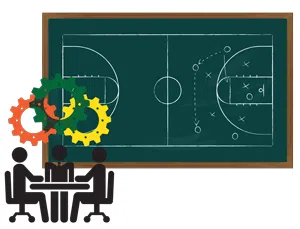Let your managers take charge of your team.
One of the most important elements of building a good team that executes with passion and vigor is to ensure you have good coaches in place. Coaches understand teamwork. They lead, guide, instruct, discipline and encourage. They teach skill and develop talent.
Coaches know how to play by the rules, but they also know how to craft plays that will efficiently and creatively use the rulebook and the playbook to make wins happen.
A coach understands the strengths and weaknesses of each player and can use those elements to create a team that performs like a champion. They help make their players aware of how they can be the best, empower them to confidently execute and enable them to serve with the gifts they have been given.
But how does the coach come to this esteemed position? He or she is first coached. Are you coaching your coaches?
It's Never Too Late to Start
Coaching hones in on helping your managers learn in ways that allow him or her to continue growing afterward. There is no end date on the learning process, so the essence of coaching is to empower your employees to know their strengths and talents and learn how to make them better on a daily basis to create value for themselves, as well as your product or service.
It is based on asking rather than commanding, on provoking thought rather than directing and on creating an ongoing sense of accountability rather than instilling a hierarchical nightmare.
San Antonio Spurs coach Greg Poppovich is one of the best coaches on the planet. He expertly navigates the entirety of the season in preparation for what matters most — the playoffs. He deals with injuries and hardships, but always focuses on the big picture. He wants to improve with every game, give players rest when they need it and empower them to let their strengths shine.
Poppovich coaches each player to coach themselves and the veterans to coach the rookies. Tim Duncan was a tremendous coach for Kawhi Leonard as they both led the team to the 2014 Championship and Leonard earned his first NBA Championship MVP.
Poppovich expects his players to compete, to be their best, to fight through adversity and failure and to win. He respects every member on the roster, which is why he gets more out of them than most teams in the NBA.
Typically, coaching in business is viewed as a few core things: delegating tasks and roles, giving reviews and providing feedback. There is so much more to it than that.
The reason it is important to coach future coaches (or managers if you'd rather overlook the sports analogies) for your company is because they'll eventually lead the company and provide the value you created a foundation for when you launched your HVACR business.
You Can't Clone Yourself
The best thing to do after you've gotten the right hires in place is to coach leaders who can use their leadership skills to manage your current and future employees. Empower them so they may empower others. Lead so they may lead.
Coach your managers with the following practices, so they can serve as coaches for the rest of your team.
Encourage failure as a conduit to success. It's likely your managers have made a mistake or two. Remind them of how their failures made them stronger and smarter and gave them a desire to be better at their craft — whether installing an AC unit or repairing a refrigeration system.
If a customer was unhappy (and the employee is the right person for the job), the employee should determine where things went wrong and how they can make it better the next time. Repeat offenses of the same mistake are obviously problematic, so we're not suggesting you should keep employees who make the same mistake over and over again.
Rather, the managers you employ should have the ability to help employees learn from failures to enhance their strengths and achieve success, while striving for constant improvement.
Empower your team and instill confidence. No one likes a micromanager. They just don't. Some people may be more task-oriented than others and desire feedback, but if you don't give someone the freedom to confidently create, build and develop, they'll stay in the box you put them in forever.
That's the beauty of the coach standing on the sidelines. You can shout out guidance here and there, but you're not in the ear of the player at every given moment. You empower them off the field, so that on the field, they can execute with grace.
Manage expectations. Make sure your managers know what is expected of them — for two main reasons: 1). So they may stay on a track for greatness and 2.) So they can help the rest of your employees to manage their own expectations.
This is the way to create a well-oiled machine. There may be a creak here and there, but if each player knows what is expected of them, your technicians won't be trying to schedule appointments and your business managers will know they'll never have to clean a coil.
Serve your team. Be a servant leader. You should never command someone to do something you wouldn't roll up your sleeves and do yourself. Show your team the importance of serving — serve the customers, serve your managers, serve your employees, serve your vendors. Show them gratitude. You will set an example that is so critical. Don't let people walk all over you, but show them how to serve.
Develop short-term memories. Don't let them forget this proverb, however — "Fall seven times, get up eight." Indoctrinating short-term memories doesn't mean your managers should forget everything they learned, but rather, they should not continuously dwell on something when it goes wrong or doesn't go their way.
This will help them to provide energy and enthusiasm for the team they are coaching, instead of keying in on the negative. The team will likely follow in suit, and when things go wrong, they'll chuck them in the dust and move on to what's next — the bigger and the better.
Make goals tangible. At Champion AC, we implement a return on heartbeats of sorts — when our managers reach their goals, we cheer it on in a variety of ways. Sometimes, we give verbal cheers, sometimes high fives and sometimes, we pick out something on their bucket lists and find out a way to contribute to them checking it off their lists.
The managers will remember the feeling they had when they achieved those goals, and if they are the right kind of leaders, they'll want the employees they are coaching to feel that sort of achievement.
Create a high performance team that will drive the company forward. Empower employees who will become your future managers and coaches. Turn them into the Tim Duncans of the HVACR world, and watch the success of your passion, your company and your team unfold.
 Ben Hubbert, co-owner of Champion AC, is a former member of Special Operations in the Air Force (Combat Control) who's now committed to helping the San Antonio community reduce its demands on the energy grid. Ben is a firm believer in education and constantly teaches new customer service approaches and techniques. Visit
www.championac.com for additional information.
Ben Hubbert, co-owner of Champion AC, is a former member of Special Operations in the Air Force (Combat Control) who's now committed to helping the San Antonio community reduce its demands on the energy grid. Ben is a firm believer in education and constantly teaches new customer service approaches and techniques. Visit
www.championac.com for additional information.


 Ben Hubbert, co-owner of Champion AC, is a former member of Special Operations in the Air Force (Combat Control) who's now committed to helping the San Antonio community reduce its demands on the energy grid. Ben is a firm believer in education and constantly teaches new customer service approaches and techniques. Visit
Ben Hubbert, co-owner of Champion AC, is a former member of Special Operations in the Air Force (Combat Control) who's now committed to helping the San Antonio community reduce its demands on the energy grid. Ben is a firm believer in education and constantly teaches new customer service approaches and techniques. Visit




